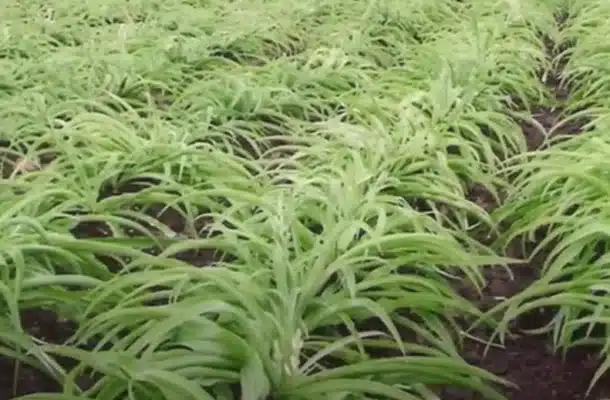Safed Musli a leaf that gives you lot of Nutrients and Health Benefits
Botanical name: Chlorophytum tuberosum Family: Asparagaceae (Asparagus family).
I tried to find the product in Tamilnadu Market but did not succeed.It seems a lot of people do not know about this product. Though my research through journals and YouTube farming and some out sketches from Ayurveda has given me the following information, Please take this as a guide for the ROUGH INFORMATION that I am giving you. Please consult any scholar before using it. Though, I love any leaf that is cooked to my satisfaction.
Through source I came to know that it is found in Monsoon Seasons only and especially in Maharashtra and Chatishgarh. This also do not know wether it is true or not. Though, there are few farming Youtube on basis how to cultivate Safed Musli.
Chlorophytum tuberosum, commonly known as Safed Musli, is a herb that is native to India. It is found in various parts of the country, particularly in forest patches. The plant has been traditionally used in Ayurvedic medicine, the traditional Hindu system of medicine. Ayurveda has a long history in India and involves the use of natural remedies and herbal treatments to promote overall health and well-being. Safed Musli, specifically, is known for its purported medicinal properties and is often used in tonics aimed at providing strength and vigor.
As of my last knowledge update in January 2022, specific information about the detailed nutritional content of Safed Musli might not be readily available in standard nutritional databases. However, I can provide a general understanding based on common characteristics of plants in the Asparagaceae family.
Plants in the Asparagaceae family, to which Safed Musli belongs, typically contain various nutrients and phytochemicals. These may include:
Saponins:
Saponins are bioactive compounds often found in plants and are associated with various health benefits.
Proteins:
Plants generally contain proteins, although the specific amino acid profile can vary.
Carbohydrates:
Carbohydrates are a common component in plant tissues, providing energy.
Fiber:
Plants often contain dietary fiber, which is beneficial for digestive health.
Minerals:
Plants can be a source of minerals such as calcium, magnesium, potassium, and others.
Vitamins: While the vitamin content can vary, plants may contain vitamins like vitamin C and certain B vitamins. Phytochemicals: These are naturally occurring compounds with potential health benefits. In the case of Safed Musli, certain phytochemicals may contribute to its medicinal properties.
Here is a more detailed breakdown of the nutrients found in Safed Musli based on the information I collected.
Ascorbic Acid (Vitamin C):
Vitamin C, also known as ascorbic acid, is an essential water-soluble vitamin with antioxidant properties. It plays a crucial role in immune function, collagen synthesis, and as an antioxidant, it helps protect cells from oxidative damage.
Anthocyanin:
Anthocyanins are a type of flavonoid, which is a class of compounds with antioxidant effects. They have lots of health benefits, that also includes anti-inflammatory and antioxidant properties.
Lycopene:
It is a powerful antioxidant and has been linked to potential health benefits, including heart health and reducing the risk of certain chronic diseases.
Carotenoids:
They have antioxidant properties and can be converted into vitamin A in the body, which is important for vision, immune function, and skin health.
Calcium:
Calcium is a mineral essential for the development and maintenance of bones and teeth. It also plays a role in various physiological processes, including muscle function, blood clotting, and nerve transmission.
Potassium:
Potassium is an essential mineral that plays a key role in maintaining fluid balance, nerve impulses, and muscle contractions. Adequate potassium intake is associated with a lower risk of high blood pressure and stroke.
Sodium:
Sodium is good for your health and fluid balance, nerve function, and muscle contractions. However, excessive sodium intake is associated with an increased risk of high blood pressure and cardiovascular diseases.
Phosphorus:
Phosphorus is a mineral that, along with calcium, is essential for the formation and maintenance of healthy bones and teeth. It is also involved in various cellular processes and energy metabolism.
Please note that these values are based on the provided information and may vary depending on the source and specific conditions of cultivation. Nutrient content can be influenced by factors such as soil quality, climate, and plant maturity.
Health benefits
The reported nutrient content in Safed Musli suggests that it may offer several potential health benefits, though it’s important to note that individual responses can vary. Here are some potential health benefits associated with the reported nutrients:
Antioxidant Properties:
Found in Safed Musli is Ascorbic Acid (Vitamin C), Anthocyanin, Lycopene, Carotenoids: These compounds are known for their antioxidant properties, which help neutralize harmful free radicals in the body. Antioxidants may contribute to reducing oxidative stress and inflammation.
Heart Health:
Lycopene, Potassium: Lycopene and potassium have been associated with cardiovascular health. Potassium helps regulate blood pressure, and lycopene may contribute to reducing the risk of heart-related conditions.
Immune Support: Safed Musli leaves
Ascorbic Acid (Vitamin C): Vitamin C is essential for immune system function. It supports the production and function of white blood cells, which play a key role in the body’s immune response.
Bone Health:
Calcium, Phosphorus: Calcium and phosphorus are crucial for bone health. They contribute to the formation and maintenance of strong bones and teeth.
Energy Metabolism:
Phosphorus: Phosphorus is involved in energy metabolism and is a component of ATP (adenosine triphosphate), which is the primary energy currency in cells.
Anti-Inflammatory Effects:
Anthocyanin: Anthocyanins have been linked to anti-inflammatory effects, potentially offering benefits in conditions associated with inflammation.
Sexual Health:
Traditional uses of Safed Musli in Ayurvedic medicine often include its use as an aphrodisiac and for addressing sexual disorders. The reported nutrients may contribute to overall vitality and well-being.
General Debility:
The combination of various nutrients, including vitamins, minerals, and antioxidants, can contribute to combating general debility and promoting overall health and vigor.
It’s important to highlight that while these potential benefits are based on the reported nutrient content, scientific studies specific to Safed Musli may be limited. Moreover, individual health conditions, dosage, and interactions with other medications can influence outcomes. If you are considering using Safed Musli or any herbal supplement for medicinal purposes, it’s advisable to consult with a healthcare professional for personalized advice.


